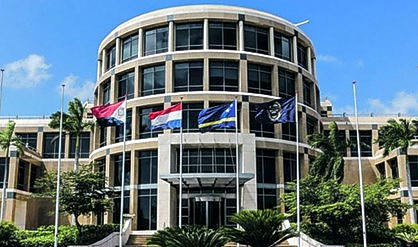Willemstad/Philipsburg – On June 6 and 7, 2019, the Centrale Bank van Curaçao en Sint Maarten (CBCS) held its third Central Banking Conference at its headquarters in Willemstad. Under the theme of “Reinventing Central Banking: Supporting Inclusive Growth and Financial Innovation,” experts from around the world converged to discuss and present on a variety of relevant topics. “Through these conferences, the CBCS hopes to broaden public interest in the fields of economics and finance as well as to highlight the important functions this institution performs in our societies,” Mrs. Leila Matroos-Lasten, in her capacity as acting president of the CBCS, said in her opening remarks. Last year, the CBCS hosted its second Central Banking Conference in March followed by a Financial Innovation Conference in June. This year, the CBCS decided to combine the two conferences covering contemporary issues in macroeconomic theory and financial innovation in one event.
A diverse range of speakers gave presentations on developments in macroeconomics and finance, including those from the International Monetary Fund, the World Bank, the government of Grenada, the Central Bank of Trinidad and Tobago, the Association of Supervisors of Banks of the Americas, the Ontario Securities Commission, the Eastern Caribbean Central Bank, IBIS Management, and economists and finance professionals from the CBCS itself.
“One of the strategic goals of the CBCS is to be a ‘state of the art’ central bank with an eye toward the future. To realize this vision, our institution must continuously adapt its policies and approaches to meet the needs and demands of our community in an ever increasingly complex and dynamic global environment,” Mrs. Matroos-Lasten added. “In this regard, inclusive growth and financial innovation are two areas where the CBCS can play a key role in supporting sustainable development of Curaçao and Sint Maarten for future generations.”
In her remarks, Matroos-Lasten pointed out that in the past, Curaçao and Sint Maarten’s economies went through structural reform programs specifically aimed at achieving macroeconomic stability and sound public finances. “However, at the same time, at least in the short term, these programs had a negative effect on people’s living standards. Our challenge, therefore, is to develop macroeconomic and fiscal policies that are simultaneously pro-growth and pro-inclusion,” she explained.
In addition, Mrs. Matroos-Lasten stressed that it is essential to have an effective resolution regime in place to solve possible failures of financial institutions in an orderly manner. The CBCS, therefore, specifically invited the governor of the Central Bank of Trinidad and Tobago and a representative of the Association of Supervisors of Banks of the Americas to share their lessons learnt in the area of resolution regimes.
Various stakeholders from a broad spectrum of backgrounds attended and lively discussions resulted during the Q and A sessions afterward. The full text of Mrs. Matroos-Lasten’s speech, as well as the presentations that were given during the conference, can be found at https://www.centralbank.cw/3rd-central-banking-conference.










